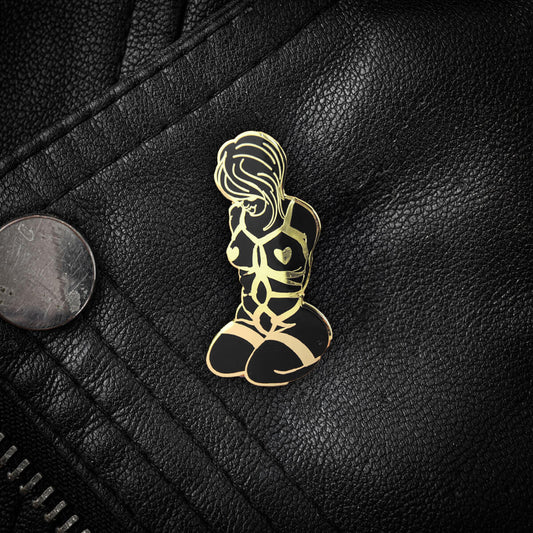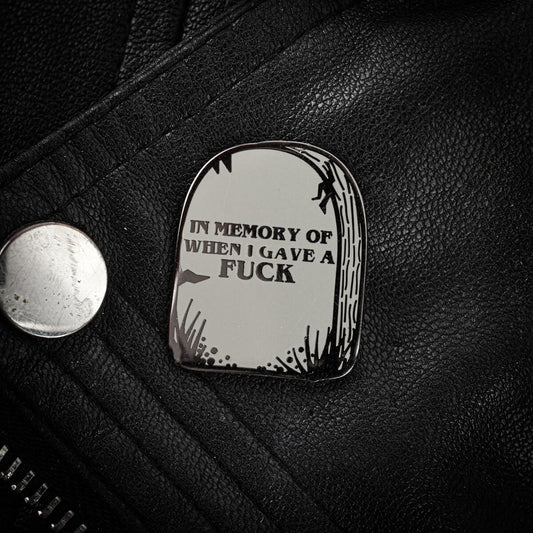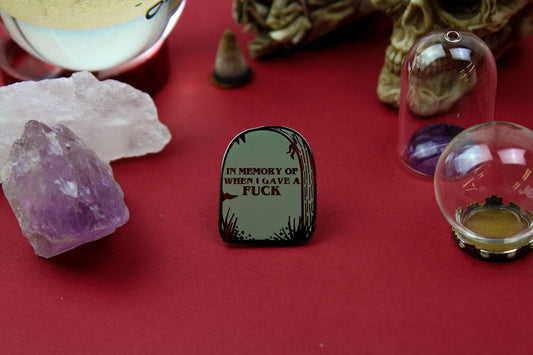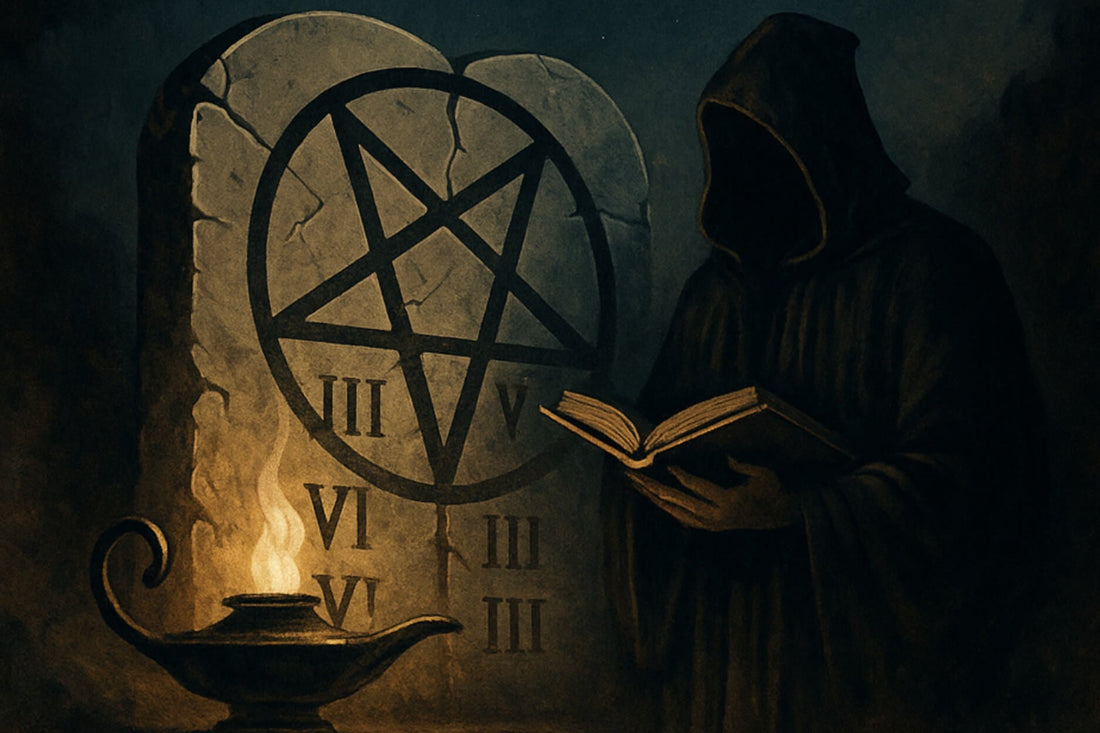
What is the Occult in the Bible?
Share
People throw the word “occult” around a lot. It gets linked to witchcraft, symbols, secret rituals, and anything that feels mysterious or forbidden. But when it comes to the Bible, things get more specific. The text doesn’t talk about the occult as one category. Instead, it names individual practices - and usually condemns them.
This article strips it back. What does the Bible actually say about occult behaviour? Where does it mention sorcery, divination, or contacting the dead? And which of today’s so-called “occult” ideas have nothing to do with scripture at all?
Forget modern conspiracy theories. This is about the text itself, and what it really says.
Key Points
- The Bible never uses the word “occult,” but it clearly condemns practices like divination, sorcery, necromancy, and seeking out mediums.
- In both the Old and New Testaments, these actions are framed as attempts to gain power or knowledge outside of God's authority.
- Stories like Saul and the Witch of Endor or Simon the Sorcerer aren’t exceptions; they reinforce the warning.
- Some passages (like the Nephilim or the Magi) get twisted into occult theories, but the text doesn’t support that reading.
- Most symbols now linked to the occult never appear in the Bible - modern panic and pop culture added them later.
What Does ‘Occult’ Actually Mean?
The word “occult” comes from the Latin occultus, meaning hidden or secret. In modern use, it refers to practices that deal with supernatural forces, hidden knowledge, or unseen energies. That includes things like fortune-telling, summoning spirits, astrology, and magical rituals.
But the Bible never uses the word occult. It talks about specific actions - like divination, sorcery, and witchcraft - not the general concept. The term “occult” only became common in the 19th century, long after the Bible was written.
That’s important. Not everything labelled occult today would’ve been seen the same way in ancient times. For example, studying the stars (astronomy) and interpreting them (astrology) were once closely tied. Some practices now considered occult were mainstream in ancient cultures.
In biblical context, the occult is really shorthand for any spiritual practice that bypasses or rejects God. It’s not about symbols or aesthetics. It’s about source. If the power comes from somewhere other than God, the Bible treats it as dangerous, deceptive, or forbidden.
Old Testament References
The Old Testament is blunt when it comes to occult practices. It doesn’t leave much room for interpretation. These actions weren’t just frowned upon - they were banned outright, often with harsh consequences.
Deuteronomy 18:10-12 is the key passage. It lists several forbidden practices:
“There shall not be found among you anyone who... practises divination, tells fortunes, interprets omens, engages in witchcraft, casts spells, or who is a medium or spiritist or who consults the dead.”
The reason? The text says these things are “detestable” and linked to the customs of other nations, which Israel was told not to imitate. These weren’t harmless traditions in the biblical worldview - they were seen as threats to spiritual purity and loyalty to God.
Leviticus 19:26 and 31 reinforces this:
“Do not practise divination or seek omens.”
“Do not turn to mediums or seek out spiritists, for you will be defiled by them.”
The idea of “defilement” shows how seriously this was taken. It wasn’t just bad behaviour - it was seen as a spiritual infection that separated people from God.
One of the most well-known examples is 1 Samuel 28, where King Saul, desperate for guidance, seeks out the Witch of Endor to summon the spirit of the prophet Samuel. The act is clearly shown as a violation of God’s will. It works, but the message is grim. Saul is told he’s going to die - and he does. The story isn’t a loophole; it’s a warning.
The Old Testament treats these practices as serious breaches. Not because they’re fake, but because they might work - and if they do, the power behind them isn’t coming from God. That’s the issue. The problem wasn’t magic being false; the problem was where the magic came from.

Photo by Pixabay: https://www.pexels.com/photo/job-print-on-book-159679/
New Testament Mentions
The New Testament doesn’t dwell on the occult as much as the Old, but when it does show up, it’s treated the same way: as something false, corrupting, and opposed to the message of Jesus.
Take Acts 8, for example. A man named Simon the Sorcerer had built a following in Samaria by performing magic. People called him “the Great Power of God.” But when he saw the apostles performing actual miracles through the Holy Spirit, he offered them money to buy the ability. Peter’s response?
“May your money perish with you, because you thought you could buy the gift of God.”
Simon’s sorcery is treated as cheap trickery, rooted in pride, not faith. He’s rebuked hard for trying to turn divine power into a transaction.
In Acts 16, Paul and his companions meet a slave girl possessed by a spirit that allows her to tell fortunes. Her owners make money off her ability. Paul eventually casts the spirit out. As a result, her owners lose their income and stir up trouble. The message is clear: even if these practices work, they’re still shown as exploitative and spiritually off-limits.
Acts 19 goes even further. In Ephesus, new Christian converts burn their scrolls of magic in a public bonfire. These weren’t party tricks - they were valuable texts. The book-burning isn’t just symbolic; it shows a clean break from occult practices. The total value of the destroyed scrolls is recorded as 50,000 drachmas - a huge amount, showing how deeply embedded this stuff was in daily life.
Across these stories, the theme stays consistent: occult power is real, but it’s not godly. The New Testament treats it as manipulation, distraction, or outright spiritual danger. Instead of just mocking it, the text goes further. It warns that these practices compete with the authority of God - and that’s why they need to be rejected.
Why the Bible Opposes Occult Practice
The Bible doesn’t just ban occult practices because they’re weird or foreign. It bans them because they represent a direct challenge to divine authority. The issue is spiritual loyalty.
Occult methods - like fortune-telling, necromancy, or spellwork - are ways of trying to gain knowledge, influence events, or seek guidance without going through God. That’s the core problem. It’s about bypassing the approved source. In the biblical framework, God speaks through prophets, not crystal balls. He reveals things on his terms, not through rituals or charm spells.
There’s also the fear of deception. The Bible frequently warns about false prophets, lying spirits, and wolves in sheep’s clothing. Occult practices are seen as opening a door to outside influence - and not the good kind. The assumption is that if you’re getting power or information from somewhere else, it’s either fake or demonic.
It’s not just about spiritual danger, though. There’s a control issue too. Occultism often promises personal power: to know the future, to change fate, to summon forces. The Bible sees that as pride - trying to take the place of God. The original sin in Genesis isn’t about spellcasting, but it is about wanting forbidden knowledge. The occult, in biblical terms, is just another version of that same desire.
In short: occult practices are banned because they pull people away from dependence on God. Whether they work or not doesn’t matter. The intent is the problem. It’s about trust, authority, and the source of power - and anything outside God is automatically ruled out.

Photo by Kevin Bidwell: https://www.pexels.com/photo/person-with-tattoos-on-the-back-3925034/
Misunderstood Verses and Fringe Interpretations
Some passages in the Bible get dragged into occult discussions even though they’re not really about the occult. These verses are often vague, symbolic, or simply misused. Over time, they’ve been twisted into something they’re not.
Take Genesis 6:1-4, for example. It talks about the “sons of God” taking human wives and producing the Nephilim, a race of giants or mighty men. The passage is cryptic and barely explained. Some interpret it as angels mating with humans. Others say it’s about noble lineages mixing with commoners. Occult circles often treat it as proof of supernatural hybrids or ancient forbidden knowledge, but the Bible doesn’t go that far. It’s mysterious, yes - but it’s not a clear endorsement of anything occult.
Then there’s the Magi in Matthew 2. They’re often called wise men, but the Greek term magoi hints at astrologers or Zoroastrian priests. They follow a star to find Jesus and bring gifts. Here’s the catch: they’re never condemned. In fact, they’re treated with respect. But they don’t perform rituals or make prophecies - they observe a sign and act on it. Some use this story to argue that astrology is biblically approved. But the text doesn’t actually say that. It just records the event without comment on their methods.
Other examples include verses about dreams, visions, or symbolic language in Revelation. These are often spiritual, but they’re not occult. They come from God, not from rituals, charms, or divination. That’s the difference.
Fringe interpretations usually start by ignoring context. They cherry-pick a phrase and inflate it. Over time, conspiracy theorists and pop culture blend biblical language with modern occult ideas, creating something the Bible never intended. Most of the symbols now linked to “biblical occultism” - like the all-seeing eye or the inverted pentagram - don’t even appear in scripture.
In short: there are strange verses in the Bible, but strange doesn’t mean occult. And just because something looks mysterious doesn’t mean it supports hidden magic, secret rituals, or supernatural shortcuts.
Occult Symbolism and Christian Panic
Most of the symbols people now call “occult” - pentagrams, goat heads, the all-seeing eye, even tarot cards - never show up in the Bible. They were added later, borrowed from other cultures or invented outright. Yet over time, especially in modern evangelical circles, these symbols got tied to ideas of satanic influence, demonic activity, and hidden spiritual warfare.
This fear peaked during the Satanic Panic of the 1980s and early 90s. Suddenly, anything unusual or mystical was seen as evidence of secret devil worship. Heavy metal bands, fantasy novels, role-playing games, and even certain cartoons were accused of corrupting children and summoning evil. The Bible was often used as a justification, but usually without direct quotes or proper context.
The problem is, the Bible’s actual warnings are more specific. It doesn’t list symbols. It doesn’t obsess over objects. It focuses on actions: trying to contact the dead, performing divination, invoking spirits, or placing trust in magical power. That’s what gets condemned - not drawing a star on paper or wearing black.
Even the pentagram, now considered a classic occult symbol, was once used by Christians. In the Middle Ages, it represented the five wounds of Christ. It only took on sinister meaning much later, through occult revival movements and pop culture.
This panic mindset also blurred the line between fiction and theology. Anything spooky or mystical was labelled “occult,” whether it had any real link to ancient practices or not. That approach distracts from what the Bible actually says - and replaces it with superstition, fear, and moral panic.
Bottom line: most so-called “occult symbols” aren’t biblical. The Bible warns against occult behaviour, not aesthetics. It’s less interested in goat statues and more concerned with who you're listening to, where you're putting your trust, and whether you're trying to access power from unauthorised sources.
